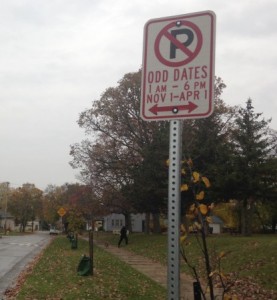No relevant opinions today; two summary orders.
In United States v. Grady, Syracuse police noticed that Grady’s car was parked in violation of the city’s odd/even street parking rules. They approached the car, shone their flashlights inside and saw, in plain view, a bag of crack cocaine on Grady’s lap. A loaded gun was also found in the car.
Assuming the officers’ approach of the car constituted a stop, the Court (Jacobs, Hall, Lynch, CJJ) held there was reasonable suspicion given the car’s being parked on the wrong side of the street. Though a car isn’t “parked” if it’s stopped only to load or unload goods or passengers, the officers observed no such activity and the Court held they watched the car for long enough — 10 seconds — before deciding to approach. “The officers were not required to conduct surveillance long enough to ‘rule out the possibility of innocent conduct.'” And the car was “parked” even though its engine was running.
The Court also rejected Grady’s claim that the trial judge erred by allowing a police detective to testify as an expert that the crack found on Grady’s lap — a 2.27-gram chunk comprising 22-25 individual doses — was consistent with distribution rather than personal use. The detective’s testimony was kosher because he didn’t “expressly ‘state the inference'” ultimately left for the jury to draw or not: that Grady intended to sell the crack rather than use it himself.
In United States v. Whitt, the Court (Jacobs, Hall, CJJ, Cote, DJ) affirmed as substantively reasonable a 720-month (60-year) sentence for a man who, district court filings indicate, used 4 minors aged 7-16 to produce child pornography.

